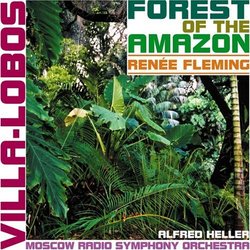| All Artists: Heitor Villa-Lobos, Alfred Heller, Moscow Radio Symphony Orchestra, Renée Fleming Title: Villa-Lobos: Forest of the Amazon Members Wishing: 0 Total Copies: 0 Label: Delos Records Release Date: 4/3/2001 Genres: Classical, Latin Music Styles: Forms & Genres, Theatrical, Incidental & Program Music, Historical Periods, Modern, 20th, & 21st Century, Symphonies Number of Discs: 1 SwapaCD Credits: 1 UPC: 013491103723 |
Search - Heitor Villa-Lobos, Alfred Heller, Moscow Radio Symphony Orchestra :: Villa-Lobos: Forest of the Amazon
 | Heitor Villa-Lobos, Alfred Heller, Moscow Radio Symphony Orchestra Villa-Lobos: Forest of the Amazon Genres: Classical, Latin Music
|
Larger Image |
CD Details |
CD ReviewsFrom the conductor Alfred Heller | 07/12/2006 (5 out of 5 stars) "Ivorx's review of my recording as well as his/her comments about Villa-Lobos are steeped in inaccuracies. 1. It was not a session orchestra that Villa-lobos conducted, but the Symphony of the Air (NBC Symphony Orchestra). 2. My recording was not just a little longer, but 27 minutes longer (circa 74 minutes total) and included the entire composition. It represented a critical edition. 3. Sadly the Villa-Lobos recording of circa 47 minutes was made when he was ill, done in one day and they kept him there until 2:00AM the next morning as reported to me by pianist Felicja Blumental. 4. Villa-Lobos was my friend and mentor. I watched him orchestrate, "Forest of the Amazon" in December 1958 and I coached Bidú Sayao for his recording. It irks me to see the uninformed write such a pontifical review as well as an inaccurate one to match his/her arrogance. After a very long time, I finally became irritated enough to say something. Apologies to all for not having done this sooner I am not saying to buy my recording, but the Ivorx review is absurd. It is based on nothing at all and misinforms the reader. This person owes apologies to the memory of Villa-Lobos and the memories of the excellent musicians who played for his album as well as one to Amazon.com." Magnificent work Russ | Richmond, VA | 08/14/2006 (5 out of 5 stars) ""Forest of the Amazon" dating from 1959 was one of Heitor Villa-Lobos' (1887-1959) last works. Much of the music was derived from the composer's film score to "Green Mansions" starring Audrey Hepburn and Anthony Perkins. However, the final score was provided by a different composer, who quoted Villa-Lobos here and there, but provided his own music elsewhere. According to the conductor, Alfred Heller, Villa-Lobos was very angry about this and, in response, developed "Forest of the Amazon" from his film score. "Forest of the Amazon" is, more or less, a 74-minute symphonic poem. The work is divided into 20 sections here, however each section flows into another without a break. Despite the length, this work holds the listener's attention throughout. Villa-Lobos was a brilliant orchestrator and knew how to write a great melody. I was immediately lured into this work by the powerful and evocative overture (Track 1). Other exciting sections include "On the way to the Hunt" (Track 9) and "Head Hunters" (Track 16). The imaginative use of male voices and percussion definitely give "Forest of the Amazon" an exotic flavor. Of course the singing by Renée Fleming is lovely, and Villa-Lobos' melodies for the soprano solo are beautiful and memorable. As an example, listen to "Love Song" (Track 17) or "Sentimental Melody" (Track 18). Amazingly, the symphonic poem is a cohesive work; with early themes reappearing later in the work. Yet the piece is incredibly varied, in which the listener takes an Amazonian journey though Villa-Lobos' unique sound world, which incorporates ethnic, popular and classical elements. I have two (very slight) reservations about this release. First, the present release represents a remastering of a 1994/1995 recording. Although, the sound quality of the remastering is quite good, it may not be up to the excellent standards of CPO's recordings of the Villa-Lobos symphonies. Second, there is an electronic instrument that accompanies the soprano in certain places (Track 4 and Track 6 for instance). I am not familiar with this instrument, but it is one of which I am not particularly fond. However, its presence is not extensive. Overall, I should mention that the playing by the Moscow Radio Symphony Orchestra, led by the enthusiastic Alfred Heller, is quite good. In fact, we owe many thanks to Alfred Heller, whose research and dedication made this recording possible. So in conclusion, this release is wholly recommendable to both fans of Villa-Lobos and those who may be new to this master. In "Forest of the Amazon" Villa-Lobos fully explores the evocative potential of the modern orchestra. This is a major statement by a major composer. Highly recommended. 74:05" More than 25 minutes longer version A. Berenschot | 04/10/2002 (5 out of 5 stars) "... this unabridged version is ... is more than 25 minutes longer than the 1958 recording by the composer himself. The total time is about 74 minutes
It is superb epic music, of the many compositions Villa-Lobos wrote one of his best! The only thing I don't like are some short wordless vocalises to imitate birds.But the real songs (sung by Renee Fleming or the choir) which appear like intermezzos on certain places in the driving orchestral music are beautiful. The recording was released before in 1996 on another label (Consonance)." |

 Track Listings (20) - Disc #1
Track Listings (20) - Disc #1